The New Age of Comics & Culture (Part 1 of 4!)
By Zak Edwards
October 1, 2012 - 10:36
One thing that I have been thinking about for a while now is the impact of the Dark Age and the work of Grant Morrison, who has generally taken an anti-Dark Ages stance on the state of comics even when he seems to be caught in it himself. In this four-part series, I want to look at comics history, its relation to cultural events, and how we seem to be entering a new age of comics, an age perhaps predicted by comic scribe Grant Morrison but maybe gaining ground outside of comics first.
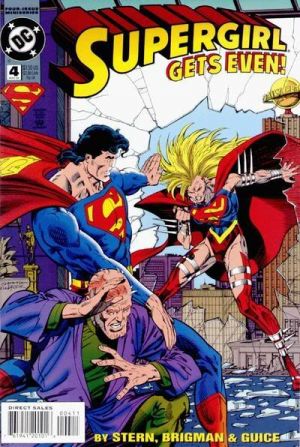 |
| This image typifies the Dark Age: good guys being bad, bad guys being good, and violence and sex at the forefront. |
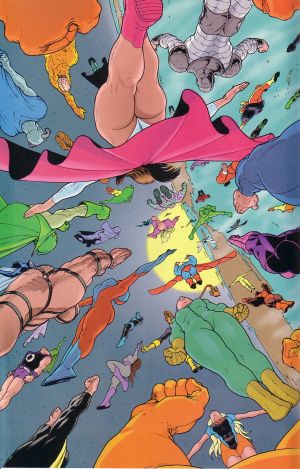 |
| Flex Mentallo ends with his heroes flying towards our earth at dawn. |
My question is this: Are we at this New Age and is it already being expressed both in and out of comics?
To think about this, I’m going to look at what I would call 9/11 fiction, works that express a certain aesthetic that (re)emerged after the terrorist attacks of September 11, 2001. Key examples include Lost, The Wire, The Ultimates, The Office, and Arrested Development. All of these works are deeply involved in and respond directly to the impact of 9/11 on our culture. There was a noticeable increase in racial profiling that led to some basic films being put out, a friend of mine argues that the Lord of the Rings trilogy turns into a basic “let’s hunt down and kill the insurgents” plot that dominated this period, but these aforementioned works speak to a general distrust in fiction. As one person put it (and I can’t remember for the life of me who, so apologies for the paraphrase and the lack of credit) “the conspiracy theory domination of nineties popular media became real in the wake of 9/11, so fiction itself became more real.” Reality TV became huge, not only because it is some of the cheapest television to produce, but because it emphasizes a mediated ‘true experience despite the extraordinary experience of the show itself. Survivor, for example, is about people being petty and cynical in an exotic and strange environment. Lost came in response, and with it The Office and Arrested Development, shows that owe a debt to reality TV and emphasize different aspects of the current human experience.
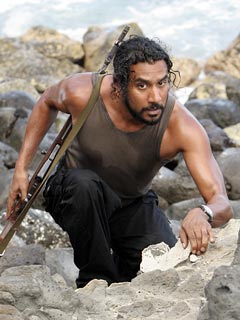 |
The Office, by contrast, deals with the enormity of the mundane and grounds the 9/11 experience so far into the everyday that it becomes absurd. The show, about a paper company and the people who live out their lives there, is more about the mundane reasons for never reaching potential because of the most heartbreakingly real excuses. This concept works across both the English and American versions of the show; Jim/Tim stays for love, Pam/Dawn for low self-esteem, and other characters because they simply can’t afford to do anything else, making them terrible examples of the work to live and live to work problem. It’s to the point that the only people legitimately enjoying their work are absurd in and of themselves (the Dwight/Gareth character). Boss Michael/David is ludicrous but also sound like those people that read books about business and then try to act on what they learn only to sound fake and plastic. It makes perfect sense that Michael falls for a pyramid scheme in one episode of the American version because it represents both his inability and his desire to know. By contrast, Dwight/Gareth simply cannot be real, they are too absurd, and their love of their occupation makes them even more hilarious. At its core, The Office represents the intense cynicism of the 9/11 condition and represents a place where the anxieties of the social climate can be analyzed and reasoned through in the most horrifying of ways: by making fun of the audience through relating to their own entrapment. We can identify too well at times and there is little sweetness and little innocence to the daily struggle in the little towns of Scranton/Slough.
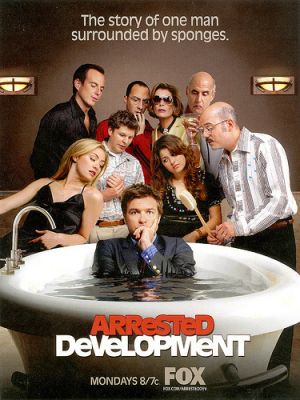 |
In comics, I can think of nothing better than The Ultimates to truly depict both the 9/11 condition and the Dark Age aesthetic. The reboot of The Avengers into the Ultimate Universe is packed full of the cynicism and distrust that appears in comics before and after 9/11. More can be read about this in an article I published a long time ago here, but there are plenty of examples of how the book relates to 9/11.
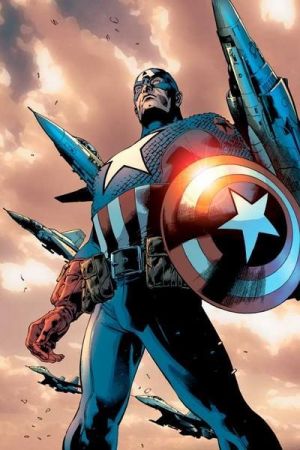 |
| Captain America is shown here with military weapons behind him, asking is he himself a weapon and, given the politics of the War on Terror, is he truly a hero? The answer is, as Dark Age books like to say, is complicated. |
In summary, the impact of 9/11 in our culture is profound and it bred an entirely new yet familiar ways of expressing ourselves through our fiction and consumption of it. Shows like Lost expressed our internal distrust because of an external, incorporeal enemy while highlighting the classic security/freedom dialectic. The Office, by contrast, made fun of our ultra-mundane existence while highlighting much of our anxieties. Arrested Development pointed to our social systems and governance by removing logic and replacing it with absurdity thinking its reasonable. The Ultimates seems to work as a bridge for superhero comics, extending the life-span of the Dark Age by talking about the New Cold War of 9/11. Overall, the 9/11 condition still exists, but I wonder about its continued relevancy, how people and are responding to the 9/11 condition, and if we are in fact at the beginning of something new.
Now that we have this groundwork, next time I’ll talk about what lies ahead and now.
Related Articles:
